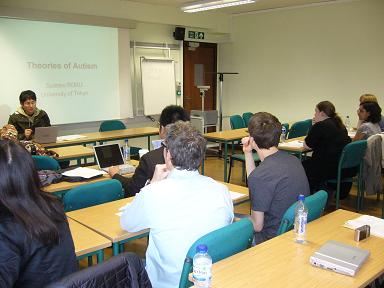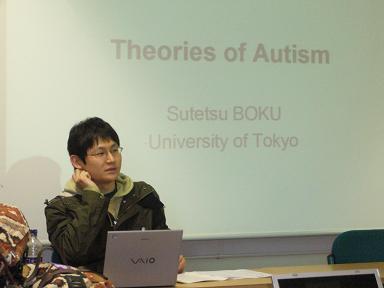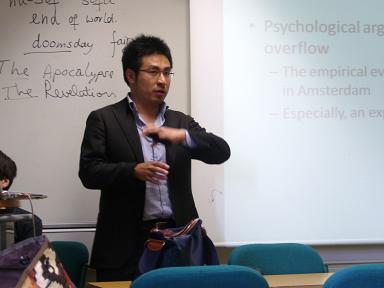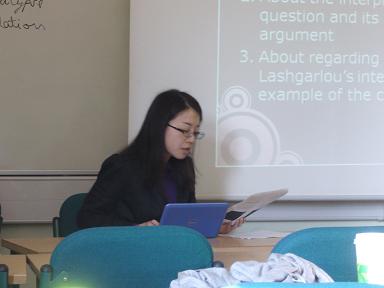[Report] Graduate Workshop of the Philosophy of Mind
The graduate workshop of the philosophy of mind held on March 25th at the University of Birmingham Philosophy Department, and four UTCP researchers made presentations in the workshop. Here is a brief report about it.

Program
Sutetsu Boku: "Theories of Autism."
Reply by Josephine Reichert
Andrew Wright: “The Phenomenal Principle and Representation”
Reply by Ryoji Sato
Ryoji Sato: "On Ned Block's Mesh Argument"
Reply by Khai Wager
Pegah Lashgarlou: “Thomas Nagel and Category Mistakes”
Reply by Haruka Tsutsui
Haruka Tsutsui: "Constructing Common Knowledge"
Reply by Nathaniel Grant (TBC)
Yu Nishitsutsumi: "Epistemic Akrasia and Desire"
Reply by Naomi Thompson

We would like to take this opportunity to thank Dr. Yujin Nagasawa and all of people who were involved this workshop.
[Reports by UTCP members]
【Sutetsu BOKU "Theories of Autism."】
I (Sutetsu Boku) gave a talk titled “Theories of Autism”. I compared three approaches to explanation of autism, namely two theory-theorist approaches and a simulationist approach. Theory-theorists explain autistic symptoms (e.g. Wing’s classic triad as well as blindness to other minds) in terms of the lack (or delay in development) of theory of mind module whose function is to form meta-representations about mental states of self and others. For instance, Leslie, a theory-theorist, explains autism in terms of the lack of a capacity to represent mental states of others. In contrast with Leslie, Carruthers, who is a theory-theorist, explains autism in terms of the lack of a capacity to represent one’s own mental states. Currie, a simulationst, explains autistic symptoms in terms of deficits in parts of the simulative (imaginative) ability. I favor simulationist approach due to its parsimoniousness.
Josephine Reichert argued for Carruthers’ theory-theory and argued against me (i.e. simulationists) on the basis of the autobiography of Daniel Tammet, who is a person with Asperger syndrome. She pointed out, for example, that Tammet do engage in imagination, and thus he has good imaginative abilities.
Here is my reply to her. I think these facts are not inconsistent with simulation-theory of autism. Simulationists do not mean children with autism cannot exercise imagination. That is, in some cases, children with autism can imagine something, although they don’t in the cases of shared pretend play due to, for example, the lack of motivation or perceptual inputs. Focus on first-person reports like Tammet’s will shed light on what prevent them from exercising their good capacity for imagination.

【Ryoji SATO "On Ned Block's Mesh Argument"】
On March 26th, we had a graduate workshop at University of Birmingham. 4 speakers were from the University of Tokyo, and 2 were from University of Birmingham. Each talk was followed by a short commentary from the other side of university.
I talked about Ned Block’s mesh argument in his 2007 paper “Consciousness, accessibility, and the mesh between psychology and neuroscience,” according to which, neural bases of phenomenal consciousness and access consciousness are different. I didn’t aim to show falsity of his conclusion but concentrate on revealing a false hidden assumption of him. I tried to show Block’s implicit assumption that phenomenal consciousness is not even causally influenced by access consciousness. Since Block’s claim is a constitution claim: mechanism for phenomenal consciousness is different from that for access consciousness, his claim itself allows causal influence between them. However, I give an objection that he has to assume attentional immunity of phenomenal consciousness to achieve his conclusion. We had discussion about the experimental details of an experiment I didn’t pay much attention to, and about weakness of some of empirical pieces of evidence I have drawn on. Both comments were very useful and it would definitely affect my future research.
After the workshop, we had dinner in a casual and friendly atmosphere, and we had nice exchange among students. I’ve found some students who shares research interests with me, and even a student who has a similar standing with me. I expect further fruitful interaction with them in the future.

【Haruka TSUTSUI "Constructing Common Knowledge"】
The title of my presentation was “Constructing Common Knowledge”. “Common knowledge/mutual knowledge” (CK/MK) is a concept that tries to describe what is precisely known when some fact is considered among people to be an open or public fact. I discussed two well-known definitions of CK/MK. The iterate definition ascribes to people an infinite number of higher-order knowledge concerning what each other knows. This seems psychologically inappropriate. According to the shared environment definition, the fact of sharing an environment and some auxiliary premises function as the basis of CK/MK, which makes an infinite number of higher-order knowledge inferable. This definition solves the problem of infinity, yet leaves further question; when we have reason to believe that the basis holds? I argued that we presuppose the occurrence of the basis by default due to our understanding of normality. This implies that, to establish CK/MK, one does not necessarily have to know about a particular individual with whom one has CK/MK by communication. Finally, I proposed two issues as future tasks; how one gains an understanding of normality and what effect communication can have on CK/MK.
The reason why I have become interested in the CK/MK notion is that it is a fundamental notion in joint action theories. Thus it is impressive that the possibility of the CK/MK notion as a joint action (WE-knowing) is mentioned in the discussion. This is what I have had in mind, and another important future subject.

【Yu NISHITSUTSUMI "Epistemic Akrasia and Desire"】
In my presentation, I compared the view of possibility of epistemic akrasia with the view of its impossibility of epistemic akrasia and concluded that epistemic akrasia is impossible. Then, I investigated a possibility of epistemic akrasia newly conceived as including desire as reason. I concluded that such epistemic akrasia is impossible because the nature of belief does not allow the type of belief formation which includes desire as reason. From these considerations, I conclude that epistemic akrasia is impossible in any way because of the nature of belief. Naomi Thompson, who is a graduate student of Birmingham Philosophy Department, made a brilliant comment on my presentation. I am sure the comment will benefit me. Also, some people criticized my presentation. At that time, I could not quite get what they pointed out because of my inadequate English proficiency. I keenly felt that I need study more. Still, the workshop was exciting and positive experience for me. I would like to take this opportunity to thank Dr. Yujin Nagasawa and all of people who were involved this workshop.







